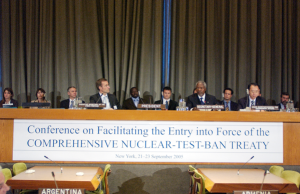 Jose Saramago, the Portuguese author and poet, once relayed a dream that in his lifetime a strike would take place in a weapons factory. He called it, “my one pathetic hope, that humanity might yet be capable of changing its path, its direction, its destiny.”
Jose Saramago, the Portuguese author and poet, once relayed a dream that in his lifetime a strike would take place in a weapons factory. He called it, “my one pathetic hope, that humanity might yet be capable of changing its path, its direction, its destiny.”
Rajiv Gandhi, addressing the U.N General Assembly in 1988, appealed, “Nuclear war will not mean the death of a hundred million people. Or even a thousand million. It will mean the extinction of four thousand million, the end of life as we know it on our planet earth…We seek your support to put a stop to this madness.”
Here in 2013, Saramago’s dream has not been realised and the threat of Gandhi’s holocaust is still a spectre in the wings. The high hopes of the Comprehensive Nuclear Test Ban Treaty seem to be just that, high hopes and hot air. In simple terms the CTBT has at its core, the aim of eliminating all nuclear test explosions in both the civil and military purpose. It opened for signatures in 1996…but as yet it is still not in force.
The superpowers of the USSR and the United States under General Secretary Gorbachev and Ronald Reagan aspired at Reykjavik twenty years ago, to the elimination of all nuclear weapons. They saw trust and cooperation as the answers that had failed them throughout the Cold War years. It was what the world needed to see and hear, and still needs to see and hear: The most powerful nation’s leaders, with the largest arsenal of nuclear weapons envisioning a nuclear free future.
The impact of non-ratification should not be underestimated now. This is a treaty that was deemed, “the hardest sought, hardest fought prize in arms control history”, by signatory and former US President Bill Clinton. Hopes were raised by the Obama administration with the famous Prague speech but inaction has set in,
“The existence of thousands of nuclear weapons is the most dangerous legacy of the Cold War…so today, I state clearly and with conviction Americas commitment to seek the peace and security of a world without nuclear weapons”.
Since Obama gave this speech however, the US approach to nuclear disarmament has been a mixed one to say the least. The Senate and leading Republicans are not making it easy by a long stretch for President Obama, even so far as announcing they will work to thwart any plan to reduce the arsenal further.
Cynics site that there is no formal enforcement of the CNTBT, therefore it is a tool with no teeth, but in what way could there be an enforcement of a weapon so extraordinary that nothing compares in potential damage infliction? Maybe we have to see it in its own right. With ratification, a ‘global norm’ could be born resulting in political and economic consequences if nations violate.
Out of 183 States, 159 have ratified the treaty. Of those remaining to ratify we have China, the Democratic People’s Republic of Korea (DPRK), Egypt, India, the Islamic Republic of Iran, Israel, Pakistan and the USA. I believe, the US must, as the leading superpower, be prepared to stand by the convictions it wishes the rest of the world to live by. What does it say when the countries who advocate nuclear disarmament are the very countries that possess it and refuse to give it up? What does it say when a President of a democratic country cannot garner the support of his country folk? Not only is this a ready excuse for other countries when pushed to disarm, but also it makes a mockery of the scale of nuclear war, as a reality that could all too easily be realised at our peril.
What is needed is a firm commitment to plant the seed of Gandhi’s dream into the twenty first century. Nuclear disarmament is By far the principle challenge of our time, and needs to take centre stage once again. In the Prague speech, Obama also said, “I’m not naïve. This goal will not be reached quickly – perhaps not in my lifetime. But now, we too, must ignore the voices who tell us that the world cannot change. We have to insist, ‘yes we can’”. It is not utopian, nor madness; rather it is the sanest path to a peaceful future.
Elizabeth Cartwright
http://www.huffingtonpost.com/2009/04/05/obama-prague-speech-on-nu_n_183219.html
